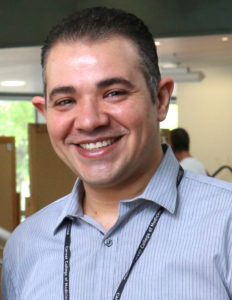Speakers: Ehab Sarsour, PhD
 Ehab Sarsour, PhD
Ehab Sarsour, PhD
Assistant Professor of Cellular & Molecular Biology/Biochemistry
Kansas City University
Dr. Sarsour is currently an Assistant Professor of Cellular and Molecular Biology in the Department of Basic Sciences at the Kansas City University of Medicine and Biosciences. He continues to hold a secondary appointment as an adjunct assistant professor in the Department of Radiation Oncology at the University of Iowa. Before he joined the PhD program at the University of Iowa, he owned and supervised his clinical laboratories in Jordan. Dr. Sarsour has significant expertise in cellular and molecular biology, cancer biology, free radicals, cell cycle, and radiation biology. During his pre-doctoral and post-doctoral training, he studied extensively the cellular and molecular biology of aging. His current research program focuses on aging, cancer, and disease microenvironment by applying the knowledge from basic and clinical research to develop an effective research and educational program with translational applications. Dr. Sarsour research work attracted private funding which funded his research work from 2006 to 2012. Recently he was a co-investigator on NIH-NCI R01 funded grants and currently a co-investigator and a PI on two pending NIH R01 applications. He has established a solid record of publications from his research work in leading peer reviewed journals such as JBC, Aging Cell, AGE, and Cancer Research.
Application of Bioinformatics in Translational Cancer Research
Utilizing multiple sources of bioinformatics can be a very powerful tool for advancing translational cancer research. This presentation will showcase the use of bioinformatics generated from Multi-Omics (genomics, proteomics and metabolomics) combined with bioinformatics from patient’s data banks to decipher mechanisms contributing to therapy resistance of pancreatic and head and neck cancers. Phase I clinical trial showed that head and neck cancer subjects with higher proliferative cancer had a better therapy outcome compared to subjects with a lower proliferative cancer. Bed to bench approach with the integration of bioinformatics was used to investigate these intriguing results and find a solution for this clinical problem of resistance to therapy in patients with less proliferative cancer. Bioinformatics from multi-omics and patient data was also applied to investigate the effects of aging stromal microenvironment on pancreatic cancer progression and response to therapy. Bioinformatics using multi-omics approach was the solution to the challenge in understanding the effects of aging normal cells on the cancer cell microenvironment, which currently lacks patient’s data; most samples only contain cancer cells that do not fully represent the cancer microenvironment. Two different cancers and two different approaches, but in both bioinformatics were the tools that were used to bridge basic science and clinical results that can be considered for translational application.
